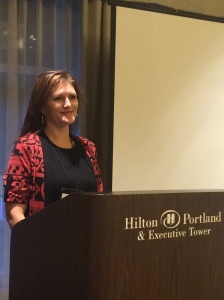Recently I traveled to present my research and I decided to make use of the travel delays to reflect on the questions discussed in the digital history class I’m taking, specifically those that pertain to how digital history fits into the profession today. The uncertainty of how digital history is changing academic practices extends beyond the classroom and museums. Of course one expects to see panels at conferences to explore these concerns and to try to shape the direction of this discipline, but what about how digitization and technology affect the other aspects of our lives in academia.
So about my travels – the first trip was to present at the Artifacts in Agraria Symposium at the University of Guelph in Ontario, Canada.
The second trip was to the Western History Association’s (WHA) annual conference – this year, in Portland, Oregon.
Myths and Mythbuster Mayhem
MYTH #1: So, one of the “concerns” about moving toward digitization is that historians are, or have been, for the most part introverted hermits who research and work alone behind stacks of books, in dark offices, and in archive dungeons.
FALSE: While it is true that much of the groundwork, and certainly the creation of our intellectual theories are done solo, historians do not work alone. First, we create working relationships with archivists as we search for evidence to support our arguments. Second, verifying the potential for developing a thesis is usually derived from sharing our ideas with colleagues, first around the office (mine actually has a door and is on the main floor), then at conferences. The third steip if the project develops, is extending our preliminary work to broader audiences for peer review and hopefully publication.
MYTH #2: Historians will not or cannot (due to that whole reclusive issue) join forces to produce a digital project. [Reminder: publishing digital history often requires collaboration and various areas of expertise – see my previous post about Writing History in the Digital Age].
BUSTED: The idea that historians do not collaborate is most strongly negated by the symposium and the professional conference. The conference is organized around a theme with panels created from various research projects also connected by a central idea or sub-theme. Then commentators analyze the correlation and give individuals feedback and suggestions to consider for their research. Admittedly, it’s not a perfect system and it can be hard to piece together how, for example, corrupt Pinkerton detectives might fit with interpretations of the Ghost Dance – but at conferences big and small we pitch our ideas to each other, if for nothing else, to have other experts tell us we might need a new direction.
The symposium, though, is centered on one theme, such as agrarian artifacts. Rather than having panelists competing for time on a program, it is ONE meeting. Each panel presents consecutively and this format allows more time for discussion. The end result is hopefully one collective project that if successful may be a publication. So, we really are brave little scholars who overcome our reticence and sacrifice our loner tendencies for our research.
There is really little to fear about collaborating on digital projects. Historians truly already work with a team: historians, archivists, librarians, editors and publishers.
Perhaps a third and more important question should be: will technological advancements replace our current professional collaborations? As more departments withdraw funding allotted for attending conferences, a greater concern might be in the suggestion to simply telecommute such events. This would be huge mistake. One change that occurred from this year’s WHA, and I would argue is a move in the right direction, is to encourage more collaboration by changing the deadline for the call for papers to allow us to work together on new ideas for panel submissions with our colleagues while we are all still in a central location, and our ideas are fresh. This can only result in better proposals, perhaps better-related themes, and in the end more scholarship. As to that questionable theme I mentioned, an argument was made that it is part of our job to work at these conferences, to think critically about why and how panels and our research is connected and to gain a better understanding history.
That panel worked, but if you want to know why panels like this are successful, you will just have to be there for the next conference.
Post script: thanks to my co-presenter and colleague, Alyce Webb for the best treat of the conference — a world-famous Voodoo doughnut. You can’t get something this yummy at a virtual meeting!




